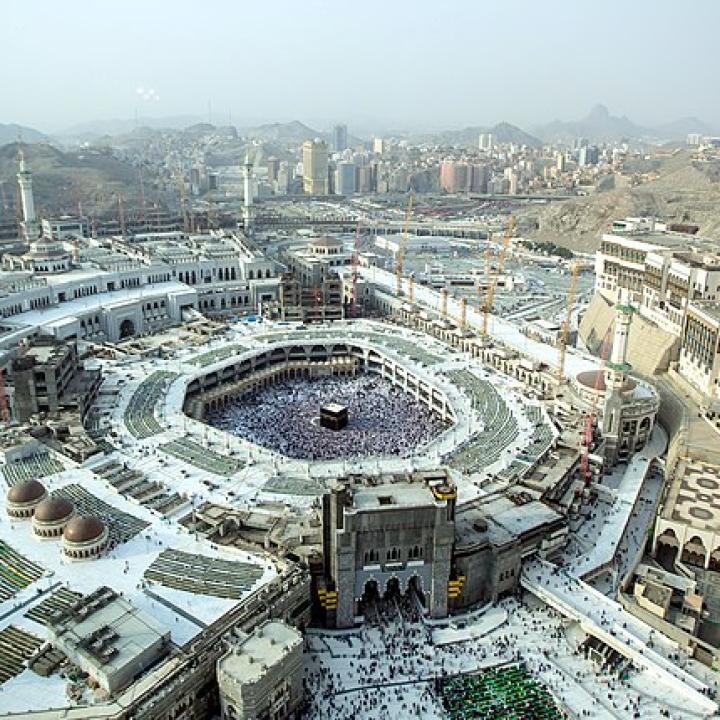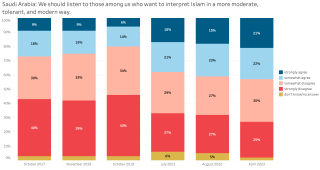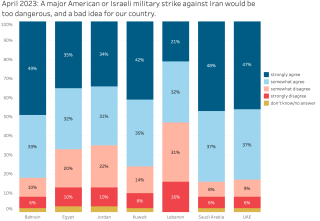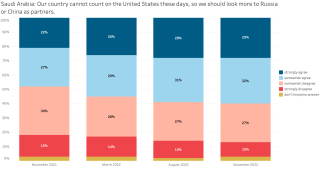
- Policy Analysis
- Fikra Forum
Saudi Survey Says: Nearly Half Back “Moderate Islam”; Few Support Internal Protests or War with Iran

Saudi minds have become considerably more open to a modern version of Islam since this question was first asked in 2017.
“Moderate” Islam Holds Its Appeal, Though Some Opposition Also Remains
By March/April 2023, nearly half (43%) of Saudis agreed with this assertion: “We should listen to those among us who are trying to interpret Islam in a more moderate, tolerant, and modern direction.” This proportion is now about double the figure recorded just six years ago, and it has remained fairly stable over the past three years.
On this key question, a highly counter-intuitive yet confirmed finding over all these recent years of surveys is the similarly split view among older and younger Saudi adults. Those under 30 are no more and no less supportive of “moderate” Islam than their elders. In this latest poll, almost exactly one-quarter of each generation “strongly” agrees with this new interpretation, with another quarter of each voicing agreement “to some extent.” On most other questions, too, the expected generational differences simply do not emerge as statistically very significant in these findings.
Corruption Still Troubles Around Half the Public, But Protests Are Unpopular
Saudi opinions regarding the lack of anti-corruption demonstrations in the Kingdom have also reached a majority plateau. As of March/April 2023, 78% of Saudis agreed with this judgment: “It’s a good thing we don’t have mass street protests against corruption, as they do in some other Arab countries.” This figure has inched up since 2020, when only 48% agreed at least somewhat that “it's a good thing we aren't having big street demonstrations here now.”
In previous surveys, around half of Saudis (54%) in late 2022 believed the Kingdom was “doing too little” in “reducing corruption in economics and politics.” Results from a poll from November 2018 had discovered that a somewhat larger majority of Saudis (63%) felt this way, showing a modest positive shift in Saudi attitudes regarding this issue. In that four-year period, slightly more Saudis, from 13% up to 21%, have even come to believe that the country was “doing too much” in combating corruption.
Saudis Still Say Ties with Iran Are of Low Importance, But Severity of That View Has Declined
Iran is one of the few issues on which notable attitudinal differences emerge between the Sunni majority (around 90%) of Saudi citizens and the small (around 10%) Shia minority, mostly concentrated in the country’s Eastern Province. For instance, while 60% of Saudi Sunnis identify Iran as “an enemy,” just 39% of Saudi Shia concur.
Similarly, two-thirds (68%) of Saudi Sunnis—but just half (54%) of Saudi Shia—say that “the restoration of diplomatic relations between Saudi Arabia and Iran” will have negative effects on the region. These responses are also important as an example of private popular disagreement with official policy, adding credibility to the overall findings from the survey.
On a related question asked in previous polls, the trends over time appear mildly moderate. The overwhelming majority of Saudis (88%) viewed relations with Iran as of little importance in 2017, and most continued to hold this view in 2022, nearing 80%. However, fewer Saudis in 2022 (44%) than in 2017 (58%) said relations with Iran were “not important at all.”
Such a change in sentiment could indicate less general Saudi hostility toward Iran as a threat to Saudi Arabia’s existence. Surprisingly, a remarkable 85% of Saudis agree with this assertion: “A major American or Israeli military strike against Iran would be too dangerous, and a bad idea for our country.” That figure includes nearly half (48%) of Saudis who feel “strongly” that way. Conversely, and almost equally unexpected, somewhat fewer than half (43%) of Saudis voice agreement with this purposely provocative proposition: “Since Iran is now getting so close to having a nuclear bomb, it’s time for an Arab country to get one too.”
Relations with China and Russia are viewed with increasing importance, but U.S. still valued
The United States is now seen by most Saudis as mainly either a “friend” (17%), a “security partner” (32%), or an “economic partner” (33%). China today garners even more positive reviews, though mostly in the economic realm: “friend” (17%); “security partner” (11%); or “economic partner” (62%).
More striking still are the very favorable, across the board results for Russia: “friend” (20%); “security partner” (34%); or “economic partner” (41%). Moreover, in line with this prevailing appraisal, a stunning three-quarters (74%) of Saudis, as of March/April 2023, agreed at least “somewhat” with this deliberately controversial claim: “In the war going on now between Russia and Ukraine, the best outcome would be a Russian victory, including the annexation of significant Ukrainian territory to Russia.”
Trends Over Time: United States, Russia, China
A majority of Saudis (56%), when asked “How important is it to have good relations with the United States?” in November 2022, believed they were of little or no importance. But this was a slight improvement from the 60% of Saudis who had taken this position five years earlier in October 2017.
Between 2017 and 2022, Saudis have indicated increased importance of the Saudi Arabia-Russia relationship. October 2017’s poll saw 62% of Saudis viewing the Kingdom’s relations with Russia with some degree of unimportance. However, these proportions were roughly reversed: “unimportant” dropped to 44% in November 2022, with a majority of Saudis (53%) viewing Saudi-Russian relations with some degree of importance.
Saudis attitudes towards the importance and unimportance of relations with China in 2017 were relatively equal at 46% and 50%, respectively. Five years later, however, Saudis had become less critical of relations with China, when nearly 60% of them view these relations with some degree of importance.
The increased sense of importance of Saudi-Chinese and Saudi-Russian relations corresponds with increased sentiment that the United States is unreliable. In November 2021, sentiment about Saudi Arabia’s not being able to “count on the United States these days” and instead “look[ing] more to Russia and China as partners” was equally split between Saudis who believed the United States was reliable (49%), and Saudis who believed the opposite (49%). One year later, a majority of Saudis (61%) believed that it would be better for their country to look more to Russia and China instead.
Methodological Note
This analysis is based on findings from personal interview surveys conducted among nationally representative samples of 1,000 Saudi citizens from October 2017 to March/April 2023. Sample selections followed standard geographic probability procedures, yielding a statistical margin of error of approximately 3 percent. These surveys were conducted by a highly qualified, experienced, and completely apolitical regional commercial firm, and strict quality controls and assurances of confidentiality were provided throughout. Additional methodological information, including full questionnaires and data sets with demographic breakdown, is available on our interactive polling platform.




